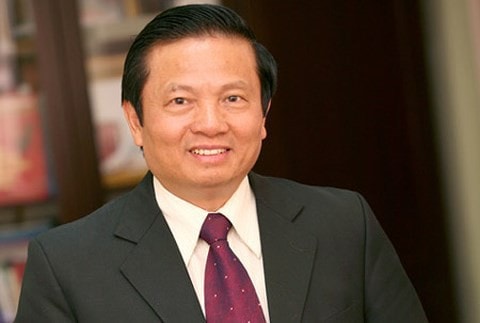Nguyên Bộ trưởng Lê Doãn Hợp: “Đạo đức là gốc của văn hóa”
Trân trọng đăng tải bài viết rất thú vị và ý nghĩa của ông Lê Doãn Hợp - nguyên Ủy viên Trung ương Đảng, nguyên Bộ trưởng Bộ Thông tin và Truyền thông, nguyên Bí thư Tỉnh ủy Nghệ An, Chủ tịch Hội Đồng hương Nghệ An tại Hà Nội.
"Chưa bao giờ trên các phương tiện thông tin đại chúng lại đề cập nhiều đến đạo đức, văn hóa như hiện nay. Người ta nói nhiều đến văn hóa gắn liền với đạo đức là hoàn toàn có lý. Bởi đạo đức là gốc của văn hóa. Văn hóa là biểu hiện ra ngoài của đạo đức. Một người có đạo đức bao giờ cũng có văn hóa. Một người có văn hóa vì người đó có đạo đức
Theo tôi, con người quý nhất là sức khỏe. Thiên nhiên quý nhất là màu xanh. Quốc gia quý nhất là văn hóa. Văn hóa dân tộc có 3 trụ cột quan trọng nhất thể hiện trên 3 mặt của xã hội, kinh tế và chính trị là: văn hóa gia đình, văn hóa doanh nghiệp và văn hóa công sở (đạo đức công vụ).
Tôi nhớ cuối năm 2006, trong hội nghị tổng kết ngành Văn hóa Thông tin; Rất nhiều đại biểu đặt câu hỏi, nên xây dựng các tiêu chí để đo đếm một người có văn hóa. Với trách nhiệm người đứng đầu ngành Văn hóa Thông tin, khi kết thúc hội nghị tôi đưa ra 3 khái niệm để xác định một người có văn hóa như sau:
Một người có văn hóa là 1 người xuất hiện ở đâu cũng làm cho người khác dễ chịu (Đó là văn hóa ứng xử).
Một người có văn hóa là một người mới gặp thì ngại, nói chuyện thì khoái, chia tay mong ngày gặp lại (Đó là văn hóa trí tuệ).

Mr. Le Doan Hop - Former Minister of Information and Communications.
A cultured person is a person who always enjoys the fruits of his legitimate labor (That is material culture).
Having these 3 elements is a person with the standard culture we desire.
In early 2007, when I visited and worked in Japan, when I had a meeting with my Japanese counterpart, I boldly said: I really admire Japanese culture, the pinnacle of which is 5 values: love children. Respect women. Respect the elderly. Honor the talented. Be strict with those who make mistakes. I asked the Japanese Minister of Culture if he could summarize in a few words what the highest cultural characteristics of the Japanese people are, so that I could easily implement them in Vietnam.
Before that, I mentioned 3 concepts of a cultured person in Vietnam so that the Japanese Minister could easily visualize and choose words. The Japanese Minister gently exchanged: Culture is so vast that it is very difficult to generalize it into a few words, but I will temporarily find a few words to answer you first, later when we meet again, I will add more. The shortest way to generalize Japanese culture is "not bothering others". I immediately realized that this is Ho Chi Minh's culture. Uncle Ho never bothered his subordinates...
In mid-June 2008, I visited and worked in Egypt. I took the opportunity to ask my Egyptian counterpart why Egyptian Muslims are allowed to marry 4 wives. The Egyptian minister happily replied: Egyptian marriage law allows Muslims to marry 4 wives with the following specific conditions: To marry a second wife, the first wife must agree in writing. There must be a house for the second wife to live in, equivalent to the first wife, and the husband must have 500,000 dollars in his account.
Similarly, to take a third wife, the two previous wives must agree in writing. Having a house for the third wife to live in is equivalent to the two previous wives and the husband must have 1 million USD in his account. Likewise, when taking a fourth wife (this is the end), the three existing wives must agree. Having a house suitable for the fourth wife to live separately and the husband must have 1.5 million USD or more in his account. I think carefully and realize that, although being allowed to take 4 wives, the foundation of Egyptian Muslim marriage still upholds culture and ethics, with 4 honored values: Voluntariness, fairness, equality and the husband must know how to make money to nurture the happiness of all 4 of his small homes.
I think culture and ethics must be taken care of from the foundation: people, family, clan, homeland. In which family culture is the root. Because family is the basic economic unit, family is the basic security unit, family is the basic cultural unit. All the good or bad things of the country, the people, even of humanity always start and originate from the family.
Uncle Ho taught: Only when the family is good will the society be good. If the family is not peaceful, the society will not be happy. On the other hand, the morality and culture of the society also depend on the morality and culture of the ruling party. These are the two most important poles that we must take care of to have a nation rich in morality and culture.
That is why General Secretary Nguyen Phu Trong and the 12th Central Committee, 8th session, have just issued a Resolution on setting an example for senior officials of our Party and State. It can be said that setting an example is the true value of ethics and culture. Our Party has the right idea, let's act resolutely to regain the people's trust from the ethics and culture of Party members and officials, by setting an example for leaders, just like in Uncle Ho's time."
